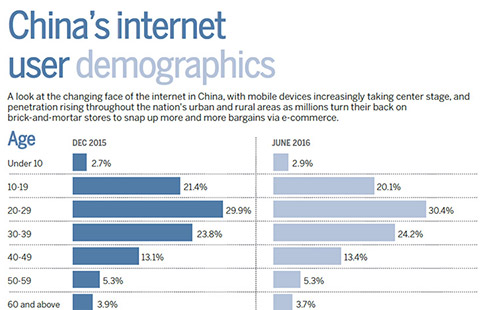Policies encourage big data investment
Big data companies in China are being encouraged by government policies to launch new applications and realize more value in the current fiercely competitive environment, according to Zhang Hao, CEO of AsiaInfo Data.
"The sector is embracing an unparalleled golden era with ever stronger government support," he said during the ongoing World Internet Conference.
Zhang added the government's preferential policies are like a shot in the arm.
"Last year, with a new policy released every two months, the government gave a boost of confidence to the industry's development," Zhang said. "This year, the State Council's latest policy packages to accelerate the industry are brewing more opportunities."
Statistics from the Global Big Data Exchange, based in Guiyang, Guizhou province, show that China's big data industry is expected to generate revenue of 16.9 billion yuan ($2.46 billion) in 2016. In the next four years, the annual average growth is expected to hit 52.8 percent year-on-year.
During the event, Zhang discussed AsiaInfo's plans to snatch the lion's share of the market.
He said the Beijing-based company would bank its future revenue from areas key to people's livelihood, such as medical insurance services and precisely targeted poverty relief.
For example, the National Health and Family Planning Commission has revealed an ambitious target to reduce government spending on medical insurance, because over-diagnoses, cheating on drug use and a lack of transparency in distribution are increasing, particularly in suburban areas.
The commission aims to halve local government expenditure on health insurance, which currently accounts for 60 percent of all medical costs.
Local officials now are plagued by the headache of finding ways to prevent the rising number of cheating cases and to control over-prescription of drugs for urban citizens.
AsiaInfo is implementing a project in Xianyang, a city with a population of 4.97 million in Shaanxi province, to help examine and monitor the use of medicines.
The big data cloud mapping platform has significantly reduced fraud by catching people who make frequent requests to doctors in different hospitals or use other people's insurance.
Qianxinan Buyi and Miao autonomous prefecture, which has a population of 3.48 million in 16,805 square kilometers of Southwest China's Guizhou province, has become the third-largest poverty-stricken region in China.
"It was difficult for the provincial government to learn whether poverty-relief officials had found the people in critical need or whether some people in deep forest villages had falsified identities to get money," local officials told Zhang.
With big data solving those problems for governments, many companies have begun to cash in on the bonanza. Their massive foray into the sector is raising market awareness.
New problems are distorting the market order, such as information leakage, illegal data trading, excessive government investment and infringement of privacy, Zhang noted. He suggested that more legal efforts are in the pipeline to counter these problems.
The company is expected to see its revenue rise 30 percent year-on-year in 2016.























